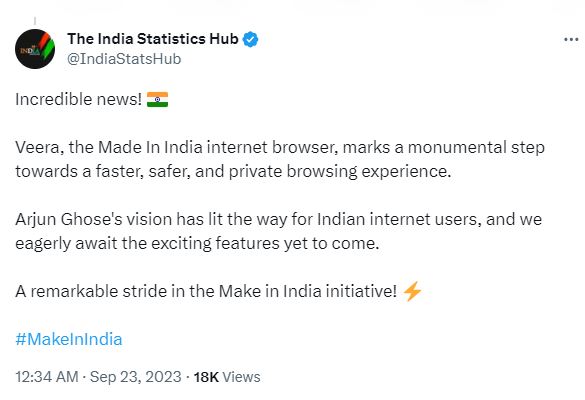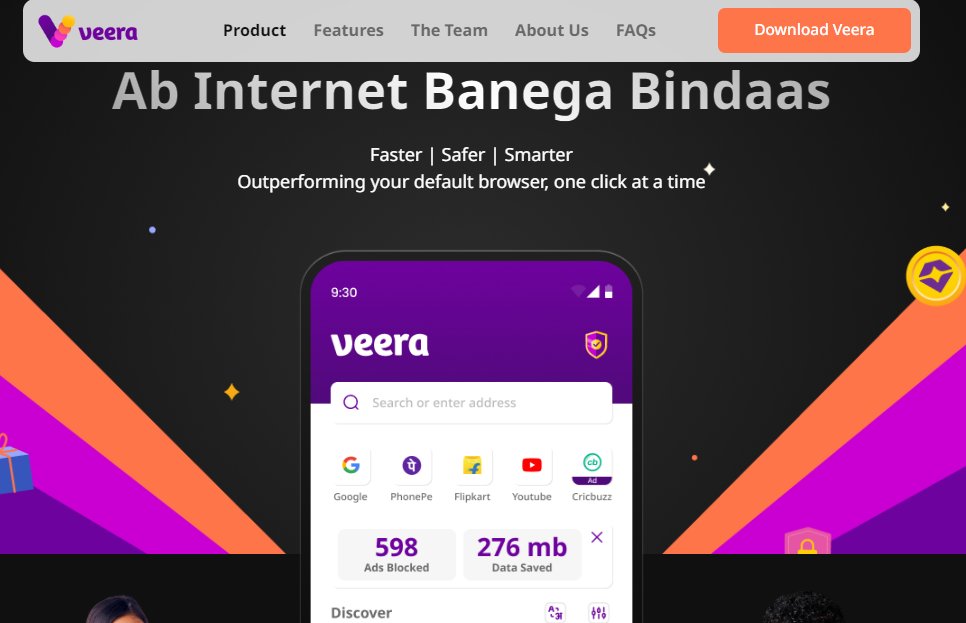
Are mobile only internet browsers safer? (image – Shutterstock)
How secure are mobile-only internet browsers?
- Google Chrome is the most used mobile internet browser in India.
- However, the browser experience is often disrupted by ads and trackers.
- Veera has unveiled a mobile-only internet browser for Indian Android users.
When it comes to mobile internet browsers, Google’s Chrome dominates Android devices, while Safari leads for IOS devices. While other mobile browsers are also available, Chrome and Safari’s control seems untouchable.
In fact, statistics from SimilarWeb show that Chrome Mobile’s market share for August 2023 stood at 58.16%. Safari comes in second at 35.49%. The next closest rival to these two giants is the Samsung mobile internet browser at 4.02%, while Opera, which has its cult followers, only makes up 1.09% of the market share.
Over the years, mobile internet browsers continue to see improvements made, especially in catering to modern website designs and such services. Unlike desktop browsers, mobile browsers are generally slower due to the limits of their processing power.
As such, some websites that are not optimized for mobile browsing could end up taking a long time to load or even have issues with loading altogether. To deal with this, some organizations have websites catering to mobile internet users. For example, bank payment pages have different desktop and mobile browsers interfaces.

Veera is a mobile-only internet browser.
Mobile internet browsers in India
Interestingly, Chrome has a much more prominent lead in mobile browsing in India. At 89.21%, Chrome browsers are pretty much the preferred mobile browser. But this is also because of the number of Android devices in India.
Statistics also show that in 2022, Android held a share of 95.26% of India’s mobile operating system market. Apple’s iOS followed this at just 3.92% market share. There are currently 650 million smartphone users in India, with Android devices also holding substantial control in the smartphone market.
Apple is trying to have an impact on the Indian market. However, given the affordability of Android devices and the multiple brands available in the subcontinent, it may be a while before Apple’s growing presence in India has any significant impact.
Given Android’s dominance on mobile internet browsers in India, there are growing concerns about users’ safety and privacy. While mobile internet browsers are built with security features, they’re still vulnerable to threats.
At the same time, the number of ads and pop-ups on Chrome browsers can interrupt the browsing experience. Some ads even use more data, which can be a problem for some users.

Veera is India’s first mobile-focused browser that brings everything desktop browsers have (and more) but optimized for a mobile experience.
Introducing Veera, India’s mobile-only internet browser
To ensure a better browsing experience on mobile devices, several Indian techies have created a mobile-only internet browser. Veera is a Made in India and the first mobile-focused browser that brings the desktop browser experience to a mobile device.
“Our mission was to craft a faster, safer, private browsing sanctuary for Indian internet users. We embarked on this journey to build an internet experience that resonates with India’s uniqueness. With the average user spending approximately 7.3 hours per day online, Veera’s impact as the window to the internet for a billion Indians is undeniably significant. But, let me assure you this is just the beginning; there are a whole bunch of features in the pipeline that we are super excited about and will launch shortly,” commented Arjun Ghose, Founder of Veera.
In a media release, the company said the mobile internet browser boasts fast speeds, clocking in 40.8 runs/minute on Speedometer – a feat that places it ahead of its browser peers. The company also highlighted that Veera boasts an integrated live tracker, showcasing the real-time count of thwarted ads and trackers and a tangible representation of saved data.
According to a report by inc42.com, Veera is built on top of Chromium, Google’s free and open-source software web browser project. Chromium is also the base code for Google Chrome and other popular browsers, including Microsoft Edge, Opera, and Brave.
In an email reply to Tech Wire Asia, the company said that the Veera platform can largely be divided into two parts, the Android mobile app (frontend) and the APIs that power it (backend). The Android mobile application is built on top of the Chromium open-source browser while incorporating the robust security and privacy enhancements of the Brave browser.
“We made this strategic choice to reinforce our deep commitment to user security and privacy. As you know, a web browser is an inherently sensitive piece of software, having privileged access to a user’s device and personal data. And it was imperative for us that the product we offered was provably secure and extensively tested. The APIs that power the app’s logins and profile management are built and managed in-house by the Veera team. Additional supporting APIs, such as those handling things like component updates are open-source, managed by the Veera backend team. We recognized the immense advantages of open-source projects with billions of users and decades of production runtime.
As a nimble, India-rooted startup, we made an early decision to build our browser on the foundation of world-class technology. By harnessing the collective power of the open-source community, we inherit a level of performance, stability, and security that would be challenging to replicate independently. Rather than reinventing every aspect of the browser, we’ve chosen to focus our time and energy on optimizing specific components, aiming to create India’s most feature-rich browser. This approach allows us to provide our users with a seamless and secure browsing experience while leveraging the strengths of established open-source technologies,” said the company.
A unique feature claimed by Veera is its capability to block third-party trackers, ads, autoplay videos, and more. While other mobile browsers have similar capabilities, Veera claims its browser does it by default.
Called Kavach, the feature also safeguards privacy during browsing. For websites that track users on the internet, Kavach blocks access to this content, which protects privacy and speeds up the browser.
“Currently, the app is available only in India. Our focus is on making for India and the Indian customer,” added the company.
Besides Veera, India’s Zoho also launched its version of a privacy-centric browser in May this year. Called Ulaa, the browser is designed to help users secure their data and activity by blocking tracking and website surveillance.
Veera is currently available on Android devices. The company, however, has plans to develop desktop and IOS versions in the future as well. Given Chrome’s dominance, it remains to be seen how big an impact Veera will have on the mobile internet browser market share.
READ MORE
- Safer Automation: How Sophic and Firmus Succeeded in Malaysia with MDEC’s Support
- Privilege granted, not gained: Intelligent authorization for enhanced infrastructure productivity
- Low-Code produces the Proof-of-Possibilities
- New Wearables Enable Staff to Work Faster and Safer
- Experts weigh in on Oracle’s departure from adland




